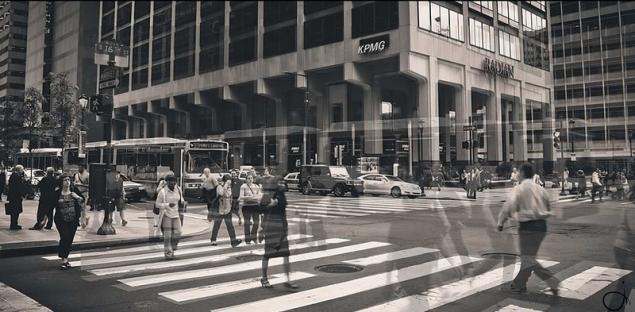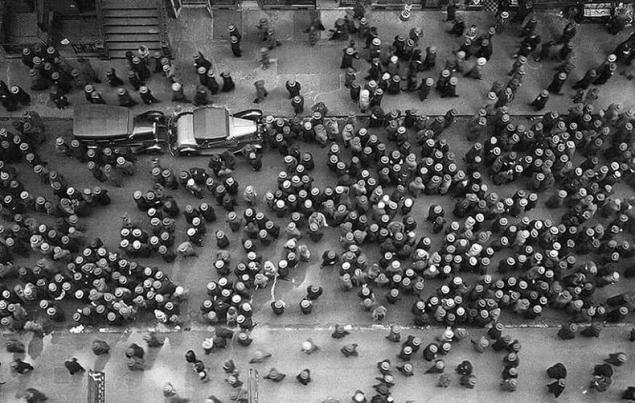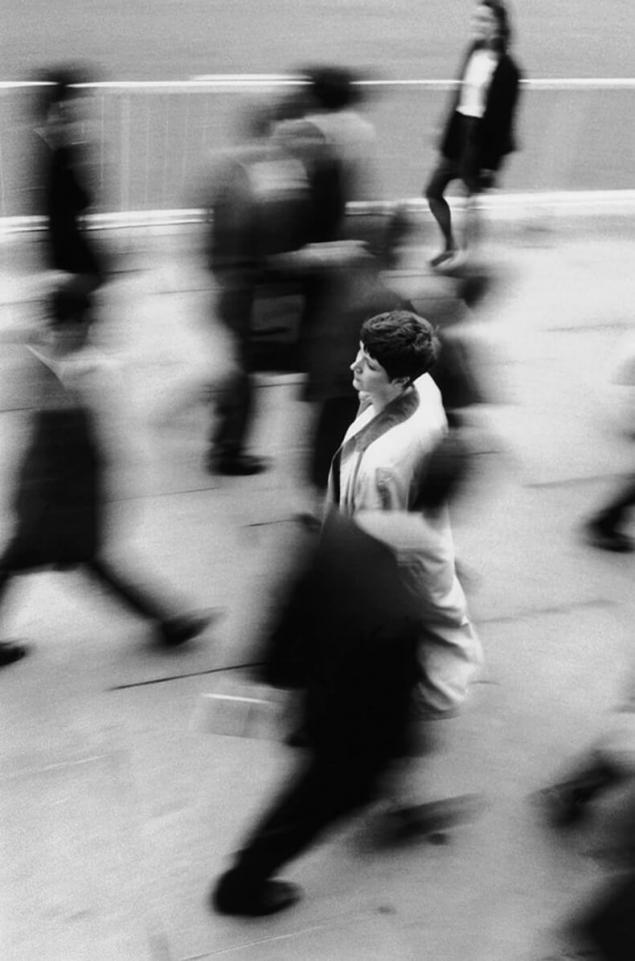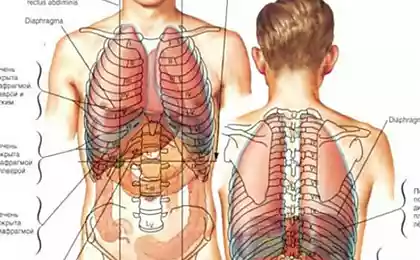639
The brain and time: fast life, slow world and the problem of patient
Social acceleration "syndrome aggressive pedestrian" and the internal sense of time: understand how the pace of modern life knocked our natural timers, why time sometimes flies a bird, and sometimes crawls with the worm and is it possible to solve the problem of patience through meditation.
You never diagnosed themselves as "sidewalk rage"? Usually it appears when it comes to our friends and acquaintances, in whom, of course, perfect, except that they are too slow. Any joint walk eventually turns into a hell. You go and think: "Oh my God, are we ever going to get where I was going, or need to accept the fact that today will be nothing but this long meaningless?". Well, or something like that.

Did not happen? Which means that either you approached the Zen, or hopelessly behind the times (which, as you will see below, not bad, and even Vice versa). In fact, in the world the problem has reached such proportions that scientists are already tests to check contemporaries on "syndrome aggressive pedestrian" (the most popular was designed by a psychologist of the University of Hawaii Leon James; according to his scale if suddenly in the crowd you "act hostile" and "enjoying thoughts of violence", syndromic already purchased).
But the problem is not so much the sidewalks, but in the fact that anger and rage we are any situation that requires patience: inhibitory drivers, slow Internet, real all the store — they drive us crazy. Even reading long articles can become painful for the modern man, so I need to hurry.

New York, 1930. Margaret Bourke-White
So why slow things drive us crazy? The answer is simple: because the fast pace of life has skewed our internal sense of time. The fact that our great-great-grandparents would have found some miracle of efficiency and speed, today, annoying us with their retardation. Patience is a virtue, which was defeated by the era of Twitter.
As the researchers note-cognitivist, the problem of patience had a great znachenie for our view: patience and impatience had evolutionary purpose; they were a balance of Yin and Yang, finely tuned internal timer that told our ancestors when it was worth to wait a little longer or when it was necessary to take action. If this timer was started to submit the internal marks, so it was time of sowing or time of refusal of futile hunting.
"Why are we intolerant? This is the legacy of our evolution," notes mark Bittman, a psychologist at the Institute for border areas of psychology and mental health in the German city of Freiburg. Intolerance has saved us from spending too much time on one meaningless thing. At the time, it gave us the inspiration to work.
But this good thing came to an end. The fast pace of life brought our internal timer is out of balance. Now we have started to appear that could not be justified quickly enough or at all justified. It got to the point that when something moves slower than we expect, our internal timer starts playing violent games, prolonging the waiting time, causing anger, disproportionate to the delay.
Neurologist Goldsmiths College, University of London, James Moore commented:
The relationship between time and emotions are very complex. A lot depends on expectations: if we expect something that takes time, we are able to accept it. Disappointment is often the result of violated expectations.
"Time stretches. We are beside ourselves" — echoes Wittman.
Beware: the pace of life continues to gain momentum as a racer at the Bonneville Speedway. In his book, "Social acceleration: a new theory of modernity" (Social Acceleration: A New Theory of Modernity) Hartmut Rosa tells us that the speed of human movement from premodern times to the present day has increased by 100 times, the connection speed jumped to 10000000 units of time in the twentieth century, and data transmission increased by a factor of 10 billion.
The situation is well illustrated by an experiment in the early 1990s held Robert Levin. The psychologist compared the pace of life in thirty-one city in the world on several indicators. He and his team figured out the average walking speed of people in different cities, the speed of execution of routine tasks, and clock accuracy in the banks. The results showed that the most stressful pace of life in the United States, Northern Europe and South-East Asia. And in the 2000s, the psychologist Richard Wiseman found that walking speed has increased by 10 percent.
This could not affect our way of life and our psyche. As studies have shown, the increasing pace of life contributes to the destruction of our patience. In tests in which psychologists and economists asked subjects would prefer they have something now or later, respondents prefer $10 today versus $100 in a year or two of piece of food now than six pieces in 10 seconds (exploring procrastination, the researchers made a similar observation, but attributed this to the fact that we do not identify ourselves for the present with a future; something to consider). Perhaps this is the reason for the popularity of fast food, tasteless but fast food.
Our hatred of the slowness is especially evident when it comes to technology.
"Now all that effective. We are less and less able to wait patiently," notes mark Bittman.
We almost demand that the web page is loaded within a quarter of a second, although there were no problems with two seconds in 2009 and four seconds in 2006. With the 2012 video, which has not worked for two seconds, has almost no hope that it will become popular.
Of course, we will not die, if the site will not load immediately. But we are likely going to feel the same that experienced the primates, when a long time had not received their food — so here we have an evolutionary inheritance. Anthropologist Alexandra Rosati says:
People expect that the win will come to them in some form, and when it comes irritation.
The result is a vicious circle. Accelerating pace of society resets our internal clocks, which begin to perceive everything as too slow, and lead us into a state of impulsive anger. Of course, your perception may change, but in General, society is becoming more impulsive.

Recent studies indicate that the situation is only getting worse. We are constantly it seems that we are late for something, and at this point we are not just faster, but now we get angry with those who, we think, detain us. However, most often it turns out that we're not late, but only was worried about this and angry unnecessarily (remember eternal fees to the airport, which almost always follow this script).
But why is this happening? Not only the increasing pace of society, but fury is able to bring down our internal timer. Our experience of time is subjective. Remember Turgenev?
"Time (known) sometimes flies a bird, sometimes crawls a worm."
And that's the truth. As explained in his book 2012, the year Claudia Hammond's "time warped: the characteristics of perception of time" (Time Warped: Unlocking the Mysteries of Time Perception), our sense of time is primarily influenced by strong emotions:
Just like the theory of relativity tells us that there is no such thing as absolute time, in our brain there is no mechanism for the accurate measurement of time.
Time stretches when we are afraid or experience anxiety, explains Hammond. For example, arachnophobe overestimate the time spent in the room with the spiders; the time for a novice, first time jumping with a parachute, long stretches impossible. Survivors of a traffic accident, say that the events seemed to be unfolding in slow motion.
But this is not because our brains are accelerated in such situations. Time is distorted, because our experiences are too intense. Every moment in which we feel threatened, seems new and bright. This physiological survival mechanism enhances our understanding of what is happening and causes more memories than in the usual situation during the same time period. In the end, our brain is fooled, believing that more time passed.
In addition, our brain, particularly the Insula, the area associated with motor skills and perception, can be measured over time by analyzing and integrating a variety of signals from our bodies, such as heartbeat, slide breeze on our skin condition and a burning anger. Brain judge time by counting the number and quality of the signals it receives from the body. Thus, if the signals come faster during a certain interval, the brain will analyze these signals and assume that the interval took much more time than it actually is. Times cited Wittman explains:
In our brain there is no clock that is ticking, but we have a constant and continuous sense of our body, which is updated every second, and we use information about those feelings, if you are wondering how much time had passed.
When we are scared (or anxious, or unhappy), our bodies send more signals to the brain, which in turn has more seconds than it took to actually. Ten seconds felt like fifteen, one hour as three, etc.
But there is another side to the relationship between the speed of society, emotions and perception of time. Neurologist James Moore was able to show that time passes faster when we have a direct connection with the subsequent event when we feel that we achieve a specific result. Scientists call this experience "temporary binding". And Vice versa. Moore notes:
"When we have no control over events or we're not feeling, the opposite occurs: the internal clock is slowing down, that is, we feel, that the time intervals grow longer".
Can we change something? Not to feel rage against any kind of delay and learn to tolerate? Scientists are convinced that it is in our power. However, we must find a way to reset our internal timers to configure the time differently. Of course, we can try to control your feelings by force of will, but this is only a temporary measure that does not correct the problem, only hides it.
Look at chimpanzees in the laboratory.
"While waiting for delayed rewards, they begin to show negative vocalization, scratching that is a sign of stress in primates, sometimes they knock on the wall, they do something like hysterics," writes Alexandra Rosati.
These chimpanzees react in the same way as our brain on hold.
There is another drawback in a willful approach. According to the psychologist from northeastern University David Distanco, strong-willed efforts make us more resistant susceptible to subsequent temptations. He cites the example of a guy who is standing in line at Starbucks: if he uses all his composure to silently stand in a long queue, he will probably allow himself to get double chocolate, but had planned to take the usual dose.
Is it possible that nothing and no one can help us? No one but ourselves. There are a number of studies that have shown that meditation and practices of mindfulness (the practice in which you are trying to focus on the present moment, not thinking about anything else) to save us from impatience, although scientists can not yet find explanation for this. Perhaps the reason lies in the fact that meditators are better able to cope with the manifestations of impatience, because they are accustomed to endure and to restrain themselves.

Ethan, Nichtern, master practitioner of new York, a follower of the Buddhist tradition of Tibet and author of the book "the Way home: a contemporary exploration of the Buddhist traditions" (The Road Home: A Contemporary Exploration of the Buddhist Path), I am sure that people who consistently meditate, are able to "make friends with the awkward space." In his opinion, meditation gives us "the technique is simple satisfaction of the moment, the way it is, without trying to change the situation."
However, as noted by Dr. Desteno, meditation is not always something that impatient people can master. And I, in General, agree with him: crazy and annoying we are for some fractions of a second, and the practice of meditation requires hours of work — it is unlikely that this is the pill that ideal for people who are unable to tolerate something more than a few minutes. But Desteno has his own advice: he offers to fight emotions with emotions.
During their work, scientists have discovered that gratitude is the shortest path to psychological patience. One experiment showed that people who wrote a short writing about someone who they were for something grateful, more readily abandoned the minor awards at this time and agreed to wait longer than promised. In the course of a series of such studies, he came to the following conclusion:
Thoughts of gratitude that you experienced, even if it has nothing to do with the annoying delay that can remind us about the value of humanity and the importance of "not to be a grabber".
Yes, unlike meditation, this method can test each of us. You're angry at a friend who is late? Remember her charming sense of humor, pleasant meetings and the support that she has provided you in difficult times. Annoying long line to the checkout?
SECRET: How to get what you want
13 of the rules of conservation of energy
Maybe happened is that you missed someone forward, although he was in a hurry, and you were grateful? But if there was a case when someone just wanted something for you to do, but didn't dare? Give thanks and rest. Remember, Gogol: "the Russian people should be grateful at least for the intention." We have lives in this country.published
Source: monocler.ru/pochemu-nash-mozg-ne-lyubit-sloupokov-i-kuda-myi-vsyo-vremya-toropimsya/
You never diagnosed themselves as "sidewalk rage"? Usually it appears when it comes to our friends and acquaintances, in whom, of course, perfect, except that they are too slow. Any joint walk eventually turns into a hell. You go and think: "Oh my God, are we ever going to get where I was going, or need to accept the fact that today will be nothing but this long meaningless?". Well, or something like that.

Did not happen? Which means that either you approached the Zen, or hopelessly behind the times (which, as you will see below, not bad, and even Vice versa). In fact, in the world the problem has reached such proportions that scientists are already tests to check contemporaries on "syndrome aggressive pedestrian" (the most popular was designed by a psychologist of the University of Hawaii Leon James; according to his scale if suddenly in the crowd you "act hostile" and "enjoying thoughts of violence", syndromic already purchased).
But the problem is not so much the sidewalks, but in the fact that anger and rage we are any situation that requires patience: inhibitory drivers, slow Internet, real all the store — they drive us crazy. Even reading long articles can become painful for the modern man, so I need to hurry.

New York, 1930. Margaret Bourke-White
So why slow things drive us crazy? The answer is simple: because the fast pace of life has skewed our internal sense of time. The fact that our great-great-grandparents would have found some miracle of efficiency and speed, today, annoying us with their retardation. Patience is a virtue, which was defeated by the era of Twitter.
As the researchers note-cognitivist, the problem of patience had a great znachenie for our view: patience and impatience had evolutionary purpose; they were a balance of Yin and Yang, finely tuned internal timer that told our ancestors when it was worth to wait a little longer or when it was necessary to take action. If this timer was started to submit the internal marks, so it was time of sowing or time of refusal of futile hunting.
"Why are we intolerant? This is the legacy of our evolution," notes mark Bittman, a psychologist at the Institute for border areas of psychology and mental health in the German city of Freiburg. Intolerance has saved us from spending too much time on one meaningless thing. At the time, it gave us the inspiration to work.
But this good thing came to an end. The fast pace of life brought our internal timer is out of balance. Now we have started to appear that could not be justified quickly enough or at all justified. It got to the point that when something moves slower than we expect, our internal timer starts playing violent games, prolonging the waiting time, causing anger, disproportionate to the delay.
Neurologist Goldsmiths College, University of London, James Moore commented:
The relationship between time and emotions are very complex. A lot depends on expectations: if we expect something that takes time, we are able to accept it. Disappointment is often the result of violated expectations.
"Time stretches. We are beside ourselves" — echoes Wittman.
Beware: the pace of life continues to gain momentum as a racer at the Bonneville Speedway. In his book, "Social acceleration: a new theory of modernity" (Social Acceleration: A New Theory of Modernity) Hartmut Rosa tells us that the speed of human movement from premodern times to the present day has increased by 100 times, the connection speed jumped to 10000000 units of time in the twentieth century, and data transmission increased by a factor of 10 billion.
The situation is well illustrated by an experiment in the early 1990s held Robert Levin. The psychologist compared the pace of life in thirty-one city in the world on several indicators. He and his team figured out the average walking speed of people in different cities, the speed of execution of routine tasks, and clock accuracy in the banks. The results showed that the most stressful pace of life in the United States, Northern Europe and South-East Asia. And in the 2000s, the psychologist Richard Wiseman found that walking speed has increased by 10 percent.
This could not affect our way of life and our psyche. As studies have shown, the increasing pace of life contributes to the destruction of our patience. In tests in which psychologists and economists asked subjects would prefer they have something now or later, respondents prefer $10 today versus $100 in a year or two of piece of food now than six pieces in 10 seconds (exploring procrastination, the researchers made a similar observation, but attributed this to the fact that we do not identify ourselves for the present with a future; something to consider). Perhaps this is the reason for the popularity of fast food, tasteless but fast food.
Our hatred of the slowness is especially evident when it comes to technology.
"Now all that effective. We are less and less able to wait patiently," notes mark Bittman.
We almost demand that the web page is loaded within a quarter of a second, although there were no problems with two seconds in 2009 and four seconds in 2006. With the 2012 video, which has not worked for two seconds, has almost no hope that it will become popular.
Of course, we will not die, if the site will not load immediately. But we are likely going to feel the same that experienced the primates, when a long time had not received their food — so here we have an evolutionary inheritance. Anthropologist Alexandra Rosati says:
People expect that the win will come to them in some form, and when it comes irritation.
The result is a vicious circle. Accelerating pace of society resets our internal clocks, which begin to perceive everything as too slow, and lead us into a state of impulsive anger. Of course, your perception may change, but in General, society is becoming more impulsive.

Recent studies indicate that the situation is only getting worse. We are constantly it seems that we are late for something, and at this point we are not just faster, but now we get angry with those who, we think, detain us. However, most often it turns out that we're not late, but only was worried about this and angry unnecessarily (remember eternal fees to the airport, which almost always follow this script).
But why is this happening? Not only the increasing pace of society, but fury is able to bring down our internal timer. Our experience of time is subjective. Remember Turgenev?
"Time (known) sometimes flies a bird, sometimes crawls a worm."
And that's the truth. As explained in his book 2012, the year Claudia Hammond's "time warped: the characteristics of perception of time" (Time Warped: Unlocking the Mysteries of Time Perception), our sense of time is primarily influenced by strong emotions:
Just like the theory of relativity tells us that there is no such thing as absolute time, in our brain there is no mechanism for the accurate measurement of time.
Time stretches when we are afraid or experience anxiety, explains Hammond. For example, arachnophobe overestimate the time spent in the room with the spiders; the time for a novice, first time jumping with a parachute, long stretches impossible. Survivors of a traffic accident, say that the events seemed to be unfolding in slow motion.
But this is not because our brains are accelerated in such situations. Time is distorted, because our experiences are too intense. Every moment in which we feel threatened, seems new and bright. This physiological survival mechanism enhances our understanding of what is happening and causes more memories than in the usual situation during the same time period. In the end, our brain is fooled, believing that more time passed.
In addition, our brain, particularly the Insula, the area associated with motor skills and perception, can be measured over time by analyzing and integrating a variety of signals from our bodies, such as heartbeat, slide breeze on our skin condition and a burning anger. Brain judge time by counting the number and quality of the signals it receives from the body. Thus, if the signals come faster during a certain interval, the brain will analyze these signals and assume that the interval took much more time than it actually is. Times cited Wittman explains:
In our brain there is no clock that is ticking, but we have a constant and continuous sense of our body, which is updated every second, and we use information about those feelings, if you are wondering how much time had passed.
When we are scared (or anxious, or unhappy), our bodies send more signals to the brain, which in turn has more seconds than it took to actually. Ten seconds felt like fifteen, one hour as three, etc.
But there is another side to the relationship between the speed of society, emotions and perception of time. Neurologist James Moore was able to show that time passes faster when we have a direct connection with the subsequent event when we feel that we achieve a specific result. Scientists call this experience "temporary binding". And Vice versa. Moore notes:
"When we have no control over events or we're not feeling, the opposite occurs: the internal clock is slowing down, that is, we feel, that the time intervals grow longer".
Can we change something? Not to feel rage against any kind of delay and learn to tolerate? Scientists are convinced that it is in our power. However, we must find a way to reset our internal timers to configure the time differently. Of course, we can try to control your feelings by force of will, but this is only a temporary measure that does not correct the problem, only hides it.
Look at chimpanzees in the laboratory.
"While waiting for delayed rewards, they begin to show negative vocalization, scratching that is a sign of stress in primates, sometimes they knock on the wall, they do something like hysterics," writes Alexandra Rosati.
These chimpanzees react in the same way as our brain on hold.
There is another drawback in a willful approach. According to the psychologist from northeastern University David Distanco, strong-willed efforts make us more resistant susceptible to subsequent temptations. He cites the example of a guy who is standing in line at Starbucks: if he uses all his composure to silently stand in a long queue, he will probably allow himself to get double chocolate, but had planned to take the usual dose.
Is it possible that nothing and no one can help us? No one but ourselves. There are a number of studies that have shown that meditation and practices of mindfulness (the practice in which you are trying to focus on the present moment, not thinking about anything else) to save us from impatience, although scientists can not yet find explanation for this. Perhaps the reason lies in the fact that meditators are better able to cope with the manifestations of impatience, because they are accustomed to endure and to restrain themselves.

Ethan, Nichtern, master practitioner of new York, a follower of the Buddhist tradition of Tibet and author of the book "the Way home: a contemporary exploration of the Buddhist traditions" (The Road Home: A Contemporary Exploration of the Buddhist Path), I am sure that people who consistently meditate, are able to "make friends with the awkward space." In his opinion, meditation gives us "the technique is simple satisfaction of the moment, the way it is, without trying to change the situation."
However, as noted by Dr. Desteno, meditation is not always something that impatient people can master. And I, in General, agree with him: crazy and annoying we are for some fractions of a second, and the practice of meditation requires hours of work — it is unlikely that this is the pill that ideal for people who are unable to tolerate something more than a few minutes. But Desteno has his own advice: he offers to fight emotions with emotions.
During their work, scientists have discovered that gratitude is the shortest path to psychological patience. One experiment showed that people who wrote a short writing about someone who they were for something grateful, more readily abandoned the minor awards at this time and agreed to wait longer than promised. In the course of a series of such studies, he came to the following conclusion:
Thoughts of gratitude that you experienced, even if it has nothing to do with the annoying delay that can remind us about the value of humanity and the importance of "not to be a grabber".
Yes, unlike meditation, this method can test each of us. You're angry at a friend who is late? Remember her charming sense of humor, pleasant meetings and the support that she has provided you in difficult times. Annoying long line to the checkout?
SECRET: How to get what you want
13 of the rules of conservation of energy
Maybe happened is that you missed someone forward, although he was in a hurry, and you were grateful? But if there was a case when someone just wanted something for you to do, but didn't dare? Give thanks and rest. Remember, Gogol: "the Russian people should be grateful at least for the intention." We have lives in this country.published
Source: monocler.ru/pochemu-nash-mozg-ne-lyubit-sloupokov-i-kuda-myi-vsyo-vremya-toropimsya/























